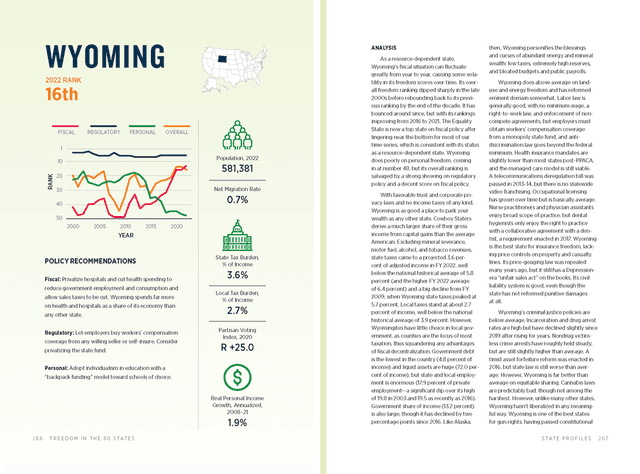Policy Recommendations
- Fiscal Privatize hospitals and cut health spending to reduce government employment and consumption and allow sales taxes to be cut. Wyoming spends far more on health and hospitals as a share of its economy than any other state.
- Regulatory Let employers buy workers’ compensation coverage from any willing seller or self-insure. Consider privatizing the state fund.
- Personal Adopt individualism in education with a “backpack funding” model toward schools of choice.
Analysis
As a resource-dependent state, Wyoming’s fiscal situation can fluctuate greatly from year to year, causing some volatility in its freedom scores over time. Its overall freedom ranking dipped sharply in the late 2000s before rebounding back to its previous ranking by the end of the decade. It has bounced around since, but with its rankings improving from 2016 to 2021. The Equality State is now a top state on fiscal policy after lingering near the bottom for most of our time series, which is consistent with its status as a resource-dependent state. Wyoming does poorly on personal freedom, coming in at number 48, but its overall ranking is salvaged by a strong showing on regulatory policy and a decent score on fiscal policy.
With favorable trust and corporate privacy laws and no income taxes of any kind, Wyoming is as good a place to park your wealth as any other state. Cowboy Staters derive a much larger share of their gross income from capital gains than the average American. Excluding mineral severance, motor fuel, alcohol, and tobacco revenues, state taxes came to a projected 3.6 percent of adjusted income in FY 2022, well below the national historical average of 5.8 percent (and the higher FY 2022 average of 6.4 percent) and a big decline from FY 2009, when Wyoming state taxes peaked at 5.7 percent. Local taxes stand at about 2.7 percent of income, well below the national historical average of 3.9 percent. However, Wyomingites have little choice in local government, as counties are the locus of most taxation, thus squandering any advantages of fiscal decentralization. Government debt is the lowest in the country (4.8 percent of income) and liquid assets are huge (72.0 percent of income), but state and local employment is enormous (17.9 percent of private employment—a significant dip over its high of 19.8 in 2003 and 19.5 as recently as 2016). Government share of income (13.2 percent) is also large, though it has declined by two percentage points since 2016. Like Alaska, then, Wyoming personifies the blessings and curses of abundant energy and mineral wealth: low taxes, extremely high reserves, and bloated budgets and public payrolls.
Wyoming does above average on land-use and energy freedom and has reformed eminent domain somewhat. Labor law is generally good, with no minimum wage, a right-to-work law, and enforcement of non-compete agreements, but employers must obtain workers’ compensation coverage from a monopoly state fund, and anti-discrimination law goes beyond the federal minimum. Health insurance mandates are slightly lower than most states post-PPACA, and the managed care model is still viable. A telecommunications deregulation bill was passed in 2013–14, but there is no statewide video franchising. Occupational licensing has grown over time but is basically average. Nurse practitioners and physician assistants enjoy broad scope of practice, but dental hygienists only enjoy the right to practice with a collaborative agreement with a dentist, a requirement enacted in 2017. Wyoming is the best state for insurance freedom, lacking price controls on property and casualty lines. Its price-gouging law was repealed many years ago, but it still has a Depression-era “unfair sales act” on the books. Its civil liability system is good, even though the state has not reformed punitive damages at all.
Wyoming’s criminal justice policies are below average. Incarceration and drug arrest rates are high but have declined slightly since 2019 after rising for years. Nondrug victimless crime arrests have roughly held steady, but are still slightly higher than average. A timid asset forfeiture reform was enacted in 2016, but state law is still worse than average. However, Wyoming is far better than average on equitable sharing. Cannabis laws are predictably bad, though not among the harshest. However, unlike many other states, Wyoming hasn’t liberalized in any meaningful way. Wyoming is one of the best states for gun rights, having passed constitutional carry in 2010. In 2018 the state passed ano-duty-to-retreat law that applies anywhere in public not just in the home, as was previously the case. Thus the only areas where the state could improve on gun rights involve removing location restrictions for carrying. Alcohol freedom is slightly above average, despite the state running liquor stores, because taxes are so low. One key change since the sixth edition is that statewide beer keg registration was eliminated. Gambling freedom is below average, but the state does have pari-mutuel wagering, social gambling, and charitable games. It legalized sports betting in 2021. Education freedom is below average, which might be surprising given the state’s individualistic sensibilities. Nonsectarian private schools are strictly regulated, and there are no school choice programs of any kind. One upside is that homeschooling is explicitly permitted by statute. Tobacco freedom is above average, as smoking bans allow for some exceptions. Cigarettes can no longer be purchased online. Retail raw milk sales were legalized in 2015. Cousin marriage is illegal, but blood tests and waiting periods are not required for marriage. Individual and political action committee contributions to political parties were regulated for the first time in 2020.

